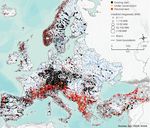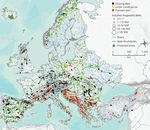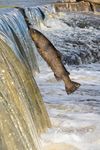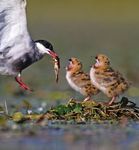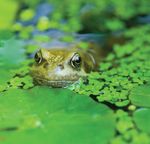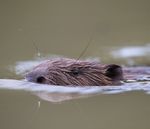The Same Coin: Hydropower Dams and the Biodiversity Crisis
←
→
Page content transcription
If your browser does not render page correctly, please read the page content below
BIODIVERSITY IN PERIL
The Same Coin:
Hydropower Dams and the
Biodiversity Crisis
WRITERS: CLAIRE BAFFERT AND SOPHIE BAUER, WWF EUROPEAN POLICY OFFICE
Dive below, look high above or walk along the banks – whichever way you look, our rivers, lakes
and wetlands are teeming with wildlife. They’re home to over 140,000 species, including 55% of all
fish species.1 And let's not forget the rest of the gang – from amphibians and mammals to thriving
birdlife, these ecosystems host it all - yet the reality is these habitats are under increasing pressure
by the influx of hydropower dams, putting biodiversity at great risk.
In Europe, all freshwater ecosystems of the healthiest, most pristine rivers in Freshwater species are
are protected under European Union Europe and many vulnerable species. the most threatened on
law. But, despite this, these habitats Over 90% of all the existing and planned
are being degraded and destroyed to hydropower plants in Europe are small,
the planet
fuel unsustainable industries, such as meaning that each plant generates a
industrial agriculture and hydropower. measly 10 MW of electricity tops. An 83% decline in the freshwater spe-
While hydropower is often regarded as cies population has been recorded in
“green”, the dams needed to operate the past 50 years alone.3 This bleak
the plants have an enormous impact on pattern is reflected all across Europe,
rivers and biodiversity – but the sector where we are experiencing the most
is booming in Europe, demonstrating a significant deterioration of rivers and
blatant disregard for these water and biodiversity decline to date, with fresh-
nature protection laws, which should water fish and mollusks being the most
limit hydropower plants. threatened. This is happening in spite
of existing legislation – the EU Water
WWF, together with other environmental Framework Directive – under which
groups, commissioned a study to find Member States must ensure all rivers
out how serious Europe’s addiction to are healthy by 2027.
hydropower is. The results, released
1. IUCN
last month, are sobering.2 With 21,387
2. WWF, EuroNatur, GEOTA, RiverWatch, 2019,
existing hydropower plants, Europe’s Hydropower pressure on European rivers: the story in
hydropower potential has been well and numbers
truly harnessed. And, yet, a staggering 2. Jumping trout, Finland.
Photo: Petteri Hautamaa / WWF Finland
8,785 additional plants are planned or
3. WWF, 2018. Living Planet Report 2018
under construction, more than 4,000 of
which are in the Balkans and Eastern 4. Hydroelectric power station in Arribes del Duero
called Mirador de Iberdrola in Salamanca. 1
Mediterranean. This region holds some Photo: Jose Luis Vega
2 4
26 | REVOLVE WINTER 2019/2020BIODIVERSITY IN PERIL HYDROPOWER DAMS
While centuries of abuse have sparked last remaining free-flowing rivers. In Ambition to make the EU water law work
this decline – including pollution and addition to supporting our freshwater is low amongst member states
excessive use of water – it is physical biodiversity, we need these rivers to
change to the shape and flow of rivers recharge vast networks of underground
which creates the biggest pressure. water, maintain floodplains that are es- 100
And for that, hydropower has a lot to sential to agriculture and flood protec-
answer for. If ever built, it is estimated tion, and protect pristine sceneries that 90
that the new generation of hydropower have an immense value for recreational
dams evidenced by the study could be and business activities. 80
the kiss of death for up to 30 freshwater
fish species.5 70
Protected on paper, 60
not in practice
Big risk, small gain
50
40
Hydropower may be a renewable en- Protected areas – such as national
ergy source, but it isn’t green. The dams parks, Natura 2000 sites and natural 30
needed to harness this natural power reserves – are protected for a reason.
destroy both rivers and their surrounding They offer a safe haven to Europe’s 20
environment, changing a river’s natural most threatened biodiversity, as well
flow, blocking fish migration routes and as the continent’s last handful of pris- 10
trapping sediments that protect river- tine, free-flowing rivers. In the EU,
0
banks and deltas against floods and these areas are also protected under
k
nd
ania
nia
rus
enia
akia
l
tria
aria
ce
atia
Italy
UK
nd
ium
blic
y
y
ourg
a
ia
nds
in
den
tuga
mar
gar
man
Malt
sea level rises. Moreover, they release EU legislation – the EU Birds and
Latv
Spa
Fran
Finla
Pola
Esto
Cyp
Aus
epu
Cro
Belg
herla
Bulg
Swe
Slov
Rom
Slov
Hun
emb
Por
Den
Ger
methane and CO2 from their reservoirs Habitats Directives (BHD) and EU Water
ch R
Net
Lux
(and are therefore not climate neutral). Framework Directive (WFD).
Cze
6
Hydropower dams also rely on a healthy
Percentage of surface water Percentage of surface water
supply of water. With droughts and water But, all over Europe, these laws are be-
Percentage of surface water bodies with at least one exemption
bodies with good or high status bodies with unknown status (to postpone WFD deadlines or lower its objectives)
scarcity on the rise, it is not a climate ing broken to allow more hydropower.
resilient source of energy. More than a quarter of all planned
hydropower in Europe is in protected The use of exemptions to the EU Water Framework Directive is rampant among Member States. The graph shows
To add insult to injury, more than 90% of areas, the overwhelming majority of that countries where the state of water is especially dire are those employing the most exemptions - either to
postpone the law's final 2027 deadline for bringing freshwater ecosystems to "good status", or to lower the law's
all the existing and planned hydropower these in Natura 2000 sites. objective. © WWF European Policy Office. Data source: EEA WISE (2018), (WFD reporting EC dashboards)
plants in Europe are small, meaning that
each plant produces less than 10 MW Under the WFD, any project that could
of energy. If all the planned small hy- lead to the deterioration of a river in the
dropower projects outlined in our study EU is against the law. The principle can The EU water law is
were carried out, their contribution to only be challenged through so-called critical for the European
the total net electricity generation in “exemptions”, which were set-up when
the EU would only be between 0.2 and the law first came into effect in 2000, to
Green Deal
2%. Compared to wind and solar, this be used in exceptional cases only. But
is hardly worth getting out of bed for, these exemptions are being handed out The European Commission cannot
let alone the destruction of Europe’s to Member States like a “get out of jail continue “business as usual” and allow
free” card: 53% of EU rivers are cov- its own laws to be breached and mis-
ered by at least one exemption, many used. In December 2019, the European
of which are to allow more hydropower Commission’s final evaluation of the
plants to be built. WFD concluded the law to be “fit for
5. Steven Weiss, 2019.
purpose”, acknowledging that its ob-
6. European overview map, © FLUVIUS, commissioned
by WWF, RiverWatch, EuroNatur, GEOTA And that’s where the process is even jectives “are as relevant now as they
7. European protected areas map, © FLUVIUS,
used – new hydropower plants are were at the time of the adoption”. The
commissioned by WWF, RiverWatch, EuroNatur, GEOTA often built without even asking for an decision concluded a two-year evalu-
8. Common Frog, Ambleside, UK. Photo: WWF exemption in the first place. ation of the law (known as a "fitness
7 8
28 | REVOLVE WINTER 2019/2020 WINTER 2019/2020 REVOLVE | 29BIODIVERSITY IN PERIL HYDROPOWER DAMS
check") and sets the EU back on course legal barrier strong, and ensure it works curtail biodiversity loss within the next
to bring life back to its rivers through Spotlight on: Austria not just on paper but in practice. Any five years”. Spotlight on: Portugal
full implementation and enforcement weakening of its standards will put a
of the WFD. With more than 4,000 existing serious question mark over the cred- If the Commission is indeed serious Portugal’s Tâmega Hydropower Scheme is financed in large part by the
plants, Austria is one of the coun- ibility of its European Green Deal. about positioning itself as a champion European Investment Bank (EIB). According to campaigners, this is in
WWF is a staunch advocate of the WFD tries with the most hydropower. for biodiversity, it needs to tackle the direct contradiction with the EIB’s own guidelines on hydropower invest-
and strongly supports these conclu- Despite this, it continues to in- The time to act is now: Biodiversity is issue at the source. Hydropower is ment not undermining EU nature protection rules and being subject to a
sions. But the proof will be in the pud- vest in it – over 100 additional sky-high on the new European Com- incompatible with the EU’s objective proper environmental impact assessment. The ongoing construction of the
ding - the Commission must now do plants are on the cards. A recent mission’s agenda and the 2020 Con- of halting biodiversity loss, its objec- Gouvães hydropower dam on the Torno River, a tributary of the Tâmega,
everything in its power to ensure that study from WWF Austria and ference of the Parties to the UN Con- tive of having clean, healthy rivers, is expected to flood part of the Alvao-Marão area – a Natura 2000 site
the law's impact is no longer gutted ÖKOBÜRO found that less than vention on Biological Diversity offers incompatible with the new European and crucial habitat for threatened species such as the European otter,
by shoddy implementation, lackluster a third of the permits authorizing a tremendous opportunity to create a Commission’s mandate. the Iberian wolf or the Pyrenean desman. According to our recent study,
enforcement, and abuse of exemp- new hydropower plants were not “Paris climate agreement” moment for Portugal is one of the few Western European countries continuing to build
tions - especially when these are to in line with requirements of the biodiversity – while the Convention large dams rather than focusing on pumped storage or refurbishment of
allow additional hydropower plants to EU Water Framework Directive, has existed since 1992, in 2020, this existing turbines.
slip under the net. which oblige Member States to meeting will be pivotal for biodiversity
go through an exemption to the conservation, as a post-2020 Biodiver-
The WFD is the best barrier to hydro- law to justify building infrastruc- sity Strategy will be agreed upon for the
power development. By taking a holistic ture that causes deterioration to following decade. The EU will operate
approach to preserving rivers and their a river. A large number of them as a single block at the table and the
ecosystems, the law mirrors the ambi- just bypassing the established European Commission’s new presi-
tion of the European Green Deal. The exemption process. dent has promised to “lead the world”
European Commission must keep this and “work with its global partners to
10
9. Dead fish near hydropower dam.
Photo: Amel Emric / Blue Heart Campaign
10. Drawing of Pyrenean desman.
Illustration: WWF / Helmut Diller
9
30 | REVOLVE WINTER 2019/2020 WINTER 2019/2020 REVOLVE | 31BIODIVERSITY IN PERIL
International Conference
In conversation with Dr. Steven Weiss
FRESHWATER BIODIVERSITY EXPERT & ASSOCIATE PROFESSOR AT THE UNIVERSITY OF GRAZ, AUSTRIA
World
How do hydropower so-called run-of-the-river plants don't and local deer species, as they can't
Sustainable
dams affect freshwater
Energy
have hydro peaking, they all accumulate carry out their normal migratory path-
fine sediments, which must be periodi- ways due to the fragmentation caused
biodiversity? cally flushed from the reservoir. by the construction of the plants and
reservoirs.
Days 2020
Depending on the type and size of the
plant, hydropower affects biodiversity
in many different ways. The number Which species are at
one impact is habitat destruction. risk should the planned
Additionally, with many plants being
hydropower plants go
built, the whole river network becomes
fragmented and fish aren't able to ahead? 4 - 6 March 2020
move up or/downstream to fulfil their
lifecycle needs. All of Europe’s large iconic species,
WELS, AUSTRIA
such as the Atlantic salmon, European
eel, the last surviving populations of
sturgeon, would be impacted by these
plants. In southern Europe, the Balkans 12
in particular, there are many hotspots, as
this is where the highest concentration So, what needs to
of endemic biodiversity is found – vir- happen?
tually all of the endemic fish species in
the Balkans would be threatened with
massive reductions should the planned First and foremost, we need to recog-
plants go ahead. nize and uphold existing legislation.
Wildlife refuges, Natura 2000 areas
and other nature reserves – all these
areas need to be protected in the way
Is it just fish that are they were meant to be protected. We
impacted? also need to recognize that we don't
have an energy crisis but an environ-
mental crisis, and climate change is
www.wsed.at
Many species are impacted by hy- only one dimension of that. We can't
11
dropower, including lots of insect life, tackle the climate crisis without taking
Additionally, certain plants function with which are a basic building block in the nature protection seriously – the two
what is known as “hydro peaking”, which
is highly destructive. Water is released
food chain of the whole riverine eco-
system. Hydropower dams do indeed
are inseparable. �
at certain times of the day to meet peak affect fish directly but also riverine life
demands for energy. In a matter of min- more broadly – such as semi-aquatic
utes, spawning and rearing grounds can wildlife (like fish otters) and a wide array
go from being several centimeters or a of birdlife, particularly fish-eating birds
11. Fish-eating birds, like the red-tailed tern, are
meter or more deep to being completely like kingfishers or pelicans. The projects affected by the impact of hydropower on the whole
dry. The fish don't have time to respond also affect the terrestrial landscape, riverine ecosystem. Photo: Goran Šafarek
and are left stranded. Although your including species like the lynx, wolf 12. Beaver, Austria. Photo: Leopold Kanzler
32 | REVOLVE WINTER 2019/2020You can also read




